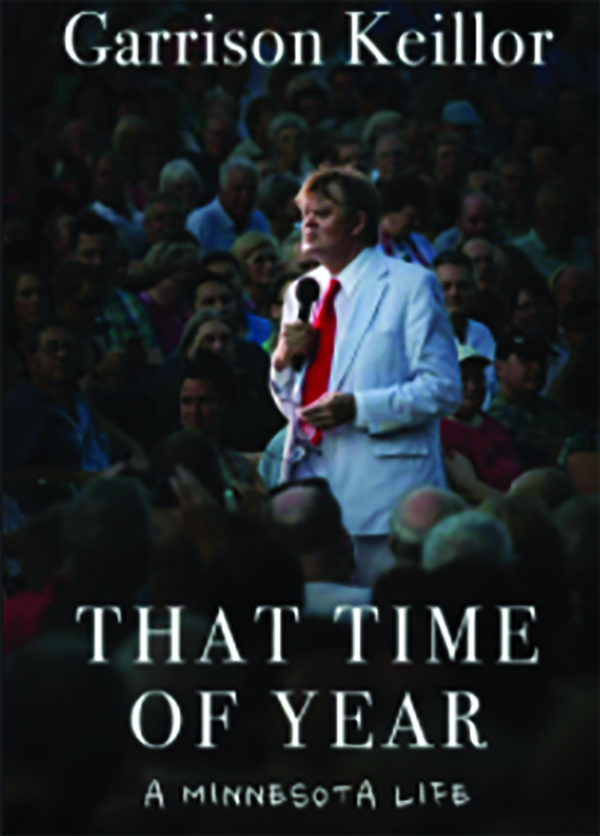When I was growing up in the 1980s and 1990s, Garrison Keillor seemed to be just about everywhere. During the 5 o’clock hour of any random Saturday afternoon, I usually found myself listening (sometimes attentively, sometimes not) to Keillor’s iconic variety-comedy-storytelling program, A Prairie Home Companion, which aired on public radio from 1974 to 2016.

The show could be corny and repetitive — just how many tales can be spun about Keillor’s fictitious burg of Lake Wobegon? — but its predictability was its greatest attribute. One sought from the show not the shock of recognition but the reassurance of stasis. All seemed right with the world as Keillor pleasantly warbled his signature song, “Tishomingo Blues,” — “I hear that old piano from down the avenue” — or recited his trademark promotional message for that most mouthwatering of made-up baking mixes, Powdermilk Biscuits.
The very title of the show alluded to its fundamentally safe and snug appeal: “Prairie” suggested Keillor’s Midwestern heritage (he was raised in, and wrote, talked, and sung about, Minnesota), “home” suggested that one did not have to wander beyond one’s doors to hear entertaining comedy and soulful music, and “companion” suggested Keillor’s own amiable geniality. Keillor is an unashamed left-winger, but even in his now-quaint anti-George W. Bush screed Homegrown Democrat (2004), he makes his political perspective sound homespun rather than doctrinaire. “My politics don’t come from the sixties, it comes from my parents’ generation who stepped out of high school into the Depression, hoed corn, drove truck, pumped gas, made do, bopped around on not much dough, went off in 1942 and fought the good war and came home and enjoyed the democratic prosperity of the Fifties,” he wrote.

Entering adolescence, I discovered that Keillor could inhabit my radio during days other than Saturday. Starting in 1993, Keillor wrote and emceed the weekday series The Writer’s Almanac. Listening to the show was akin to being passed a plate of mashed potatoes by an uncle, except that Keillor was not giving you boiled tubers but literary factoids, anniversaries, and readings. It was just trivia, but it made you feel smarter and better read.
Keillor, then, was the radio equivalent of a comfy sofa or a big pitcher of Kool-Aid. In the summer of 2016, upon stepping down from A Prairie Home Companion, he was even profiled on CBS’s Sunday Morning, which might be said to be akin to state media for the sort of proud middle-of-the-roadness he exemplifies. As it happens, it was just before Keillor’s retirement that I had the occasion to conduct a lengthy email interview with him for a profile in Humanities magazine. As near as I could tell, he was the same guy I had heard all those years on the radio: genuinely funny and authentically unassuming.
I write all this to remind readers of Keillor’s former ubiquity and the oddness of his recent sidelining after getting sucked into the #MeToo vortex. In 2017, an initial allegation of improper conduct with a female colleague was followed by other allegations of workplace innuendo or carryings-on, some of which suggested foolishness, but none of which warranted the fall that followed. The Writer’s Almanac fell silent until Keillor resurrected it on his website, and his column in the Washington Post was given the heave-ho. Where was CBS’s Sunday Morning now?
Now, in a bid to regain some sense of his currency, the 78-year-old has reemerged with a one-two literary punch shepherded by the enterprising Arcade Publishing, which earlier this year brought out Woody Allen’s memoir, Apropos of Nothing, cornering the market on resurrecting the careers of once-popular, now-disgraced comic figures. This fall, the same outfit has steered to publication a pair of fresh Keillor books: a memoir, That Time of Year: A Minnesota Life, and a novel, The Lake Wobegon Virus.
The novel is a nifty flight of fancy: The sensationalist title refers not to COVID-19 but to an imaginary plague that induces unseemly forthrightness among the inhabitants of Lake Wobegon, a “temporary loss of social filter,” as one character puts it. For example, at a meeting of the remnant of the Men’s Prayer Fellowship, one member admits to finding the whole concept of religion to be hooey: “I have to say that the idea that there is a daddy in the sky who is arranging our lives and doing favors in exchange for our admiration is an old hoax, and everybody knows it deep down in your hearts and doesn’t dare say it.” Sketching Minnesotan reserve, Keillor adds: “Conversation was muted after that and stuck mainly to the weather, the long-term forecasts.”
To be sure, this rambling, long-way-around-the-bend book is not a first-rank Keillor novel on the order of WLT: A Radio Romance (1991) or Love Me (2003), but it passes the time in the same agreeable fashion as A Prairie Home Companion. It’s something like the literary equivalent of background music, a cacophony of characters, incidents, and digressions that all have the patina of Midwestern authenticity. Only an insider could write these scenes about these people. “Lutherans get nervous if the pastor in the pulpit has no text,” Keillor writes. “They worry that she’ll go on at length and the pot roast will burn in the oven.”
On the other hand, That Time of Year is a major work: a thoroughgoing portrait of its artist as both a young man and a somewhat sad but grateful oldster. Each period of Keillor’s life is recounted, frequently in novelistic detail, with humor and humility, but perhaps the most compelling, given recent events, are those chapters focused on the run-up to his retirement from radio and what came next.
Keillor sounds alternately proud of having overseen a long-running program with a deep bench of talent and somewhat bewildered by the extent of its success. Keillor, in senescence, affects a kind of dissipated, regretful tone. He admits to feeling as though he failed to deliver an appropriately compelling script for Robert Altman’s screen version of A Prairie Home Companion and, in the book’s most arresting passage, seeks forgiveness for harboring anger at the accusers who brought him low during an encounter with an Episcopal deacon, praying for healing at the Church of St. Mary the Virgin in New York. “Whenever anger whispers in my ear, prayer drives it away,” he writes. As celebrity memoirs go, Keillor’s is candid, philosophical, and funny.
Years earlier, recovering from a stroke, Keillor notes that a nurse wrote in her chart that he possessed, among other things, a “flat affect.”
“Other people aim for excellence, I am comfortable with wakefulness,” he muses, but surely, he sells himself short. In fact, the appearance of these books has something of the thrill of finding an old shoe once thought misplaced. When a major pop culture figure is disappeared from view for several years, we do not realize how palpably his absence is felt until he mounts a comeback. Do you hear it? In the distance, once again, the sounds of that old piano down the avenue.
Peter Tonguette writes for many publications, including the Wall Street Journal, National Review, and Humanities.
